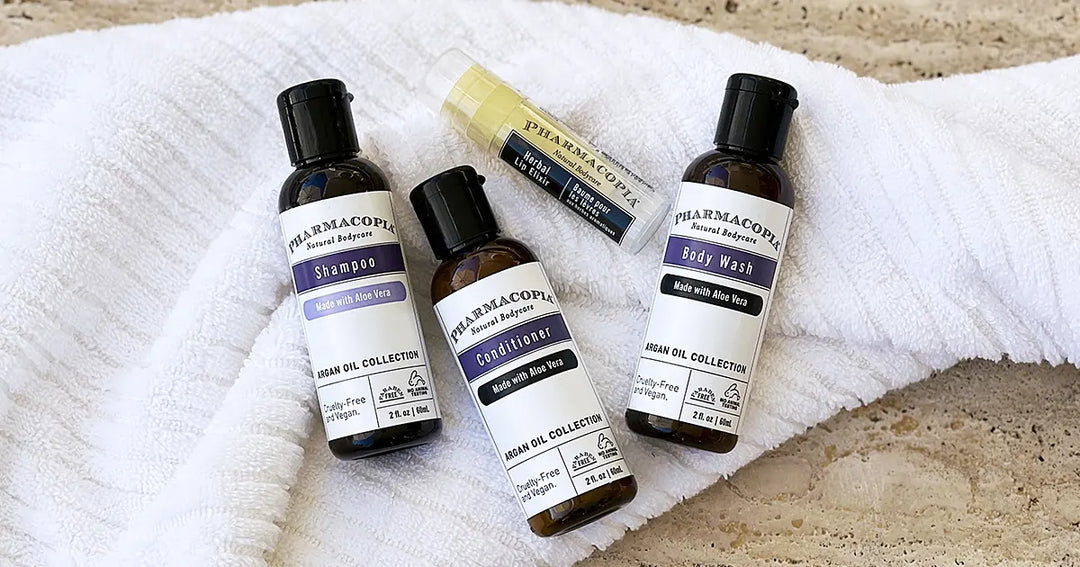How to Hydrate Skin Naturally
Cooler weather is on its way and with that comes changes in your skin: skin can become drier, rougher, and just plain dehydrated. That’s thanks to not just the cooler air and wind that accompanies Fall, but the drop in humidity, too. (Indoor heat sucks moisture from the air; the more time we spend indoors, the more risk we have of becoming parched.) Post summer skin also tends to be a bit more irritated if you’ve been exposed to the sun’s UV rays. There are easy, and natural, ways to prevent dry skin—and restore moisture and hydration if your skin is already on the drier side.
What’s Going On When Skin Is Dry and Rough?
 The most common reason for dry, rough, and sometimes flaky and irritated skin is a compromised skin barrier. The barrier is the outermost layer, or stratum corneum, of the skin. It’s comprised of tightly packed skin cells called corneocytes, surrounded by lipids. The job of this barrier is to keep the bad stuff out (the sun’s UV radiation, toxic chemicals, and pathogens like harmful bacteria) and keep in the good stuff (your skin’s moisture and body’s water).
The most common reason for dry, rough, and sometimes flaky and irritated skin is a compromised skin barrier. The barrier is the outermost layer, or stratum corneum, of the skin. It’s comprised of tightly packed skin cells called corneocytes, surrounded by lipids. The job of this barrier is to keep the bad stuff out (the sun’s UV radiation, toxic chemicals, and pathogens like harmful bacteria) and keep in the good stuff (your skin’s moisture and body’s water).
The problem is our skin’s barrier takes a beating, day in and day out, by pollution, sun exposure, our environment (hot and humid or cool and dry weather), and what we do to our skin. Exfoliating too frequently, washing too many times during the day, or using too harsh skin-care products are common reasons for a disrupted skin barrier. When this happens, the skin can’t hold enough water in the skin—and can’t effectively protect the skin. The result: irritated, itchy, dry, and rough skin. Dehydrated skin can also look ashy in color (i.e., not glowing, dewy, and radiant). What’s more: skin is more sensitive and is more prone to skin conditions like acne, and skin infections. The best way to hydrate skin is by re-assessing your skincare regimen and using the right ingredients to keep skin soft, smooth, and hydrated.
Simplify Your Skincare Routine
If you feel your skin starting to become tight and dry, it’s a first sign that something is going on with your skin’s barrier function. The best thing to do is analyze your skincare routine and simplify it.
- Wash morning and night—no more. Over washing can trigger dry, sensitive skin. Stick to a twice-daily schedule for smoother, more radiant and healthier skin
- Use lukewarm, not hot water.Hot water can strip the skin of moisture. Instead, opt for cooler temps and finish with a splash of cold water to rev up your circulation.
- Steer clear of harsh cleansers that can strip moisture from the skin. Fewer and simpler ingredients are best. That’s why our body cleansers and natural body bars are formulated with simple and gentle ingredients that help to nourish the skin’s barrier like hydrating shea butter, argan oil, and glycerin. What’s more: they’re formulated without parabens, sulfates, phthalates, animal ingredients, and synthetic fragrances or dyes—all of which can irritate sensitive skin.
- Exfoliate once weekly, not once a day. The skin cells naturally shed themselves every 28 days; this gets rid of the dry, dead skin cells and allows the new, radiant skin cells to shine through. It also allows for products like moisturizers to better penetrate into the skin. This cycle slows down as we age, which is why exfoliation is important. But exfoliating too much or with too many different products (e.g., an exfoliating cleanser, followed by an exfoliating scrub or moisturizer) can strip the skin’s outer layer, sapping moisture from the skin and leaving it feeling tight, parched, and red and irritated.
- Pat, don’t rub, your skin dry. Rubbing with a towel is a form of physical exfoliation and can irritate sensitive skin or skin with a disrupted barrier function. Gently patting dry and allowing for some moisture to remain on skin afterward when applying lotion will help skin better retain moisture.
- Apply lotions with plant oils to restore your skin’s barrier. Our Pharmacopia body lotions all contain ingredients like jojoba oil, shea butter, and argan oil that help to nourish the skin’s barrier. Research shows that these ingredients nourish the skin and act as a protective barrier to the skin, helping to hold in moisture. Many of these oils also have antibacterial, anti-inflammatory, and antioxidant effects on the skin, helping to heal the skin and restore balance—and a smooth, even-toned appearance. Try applying after a bath or shower to help seal in moisture.
- Try skin-nourishing options from your pantry. There are plenty of ingredients like olive oil, Greek yogurt, honey, oatmeal, and coconut oil you can use on your skin to help nourish and hydrate it. Try these natural ways to hydrate your skin:
Coconut oil: This oil is chock-full of powerful antibacterial and antimicrobial fatty acids. Applying to slightly damp skin, particularly skin on the feet which can get super dry, makes it act as a protective layer, preventing moisture loss from the skin. Try washing feet and applying (layering with a pair of socks) before bed to hydrate skin naturally overnight.
Honey: A natural humectant, honey pulls in moisture to the skin. Try applying to rough patches of dry skin as a spot treatment.
Oatmeal: Add a cup of oatmeal to a warm bath to help your skin retain some of the moisture from the water. Oatmeal contains beta-glucan, a substance that can absorb water; antioxidants called phenols; oils; and substances called saponins, which act as a cleanser.
Olive oil: Rich in skin-nourishing vitamin E and squalene, olive oil increases the skin’s ability to retain moisture. You can apply a thin layer after cleansing and applying lotion. (Gently wipe off any excess.)
Simple, Natural Ingredients Are Best
There is so much healing in what nature provides, which is why at Pharmacopia, we created all our products from plants. Simple plant-based ingredients like shea butter, jojoba oil, argan oil, and plant extracts make our skincare products good for all skin types, including those with sensitive skin.


